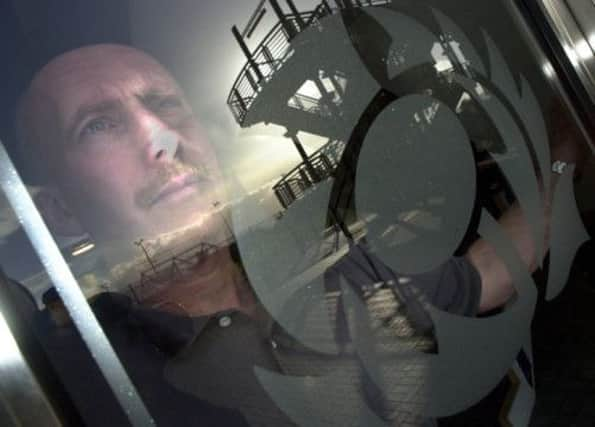Ian Rankin on standing for SRU vice-presidency


The former player and coach is standing for the SRU vice-president’s spot which becomes vacant when Donald Macleod makes the step up to president at June’s AGM. It looks like a three-horse race, with Rankin up against Jock Millican and Archie Ferguson. With the VP now graduating to president one year on, Rankin has his eyes on the main prize and the man who has stirred things up in the past hopes to do so again if his bid is successful.
“Some see the position as an ambassadorial role but I think a bit differently, I see it as a hands-on job,” he says. “I have rattled cages for the last four years on the lack of respect for the club game within Murrayfield, for the people involved both on and off the pitch.
Advertisement
Hide AdAdvertisement
Hide Ad“I reckon that the current club standard is arguably better than what the pro teams were playing a decade ago, that is how much things have moved on. When Andy Irvine handed out the jerseys to the club international XV he said that they were all better conditioned than anyone he had ever played with.
“There are a lot of good people within Murrayfield but there are just too many of them who are distanced from the club game. I have spoken to people throughout Scotland and they feel disenfranchised, there is a ‘them and us’ attitude [with the SRU] when it’s meant to be the ‘Union’.”
At the top of Rankin’s wishlist is a pathway for club coaches into the professional game and his point about internal promotion resonates after a week in which an Australian (Scott Johnson) succeeded a New Zealander (Graham Lowe) as the SRU’s director of rugby and the national forwards job went to former Welsh hooker Jonathan Humphreys – another slap in the chops for homegrown talent such as Shade Munro, Carl Hogg and Stevie Scott.
Had Munro got the national job, and he has been quietly effective at Glasgow, his promotion would have left a vacancy at Glasgow to be filled by one of the next generation of younger club coaches, which is how things are meant to happen. Instead the SRU appear to have outsourced the future of the game in Scotland when insiders at least know the lie of the land they grew up in.
Humphreys worked successfully alongside Scotland boss Scott Johnson at the Ospreys but, with the SRU now headhunting a head coach to replace the Aussie, why was the former Welsh hooker hired ahead of the new appointment? Had the SRU given the Scotland forwards job to Scott on an interim basis, they could have let the new head coach appoint his own man as and when he arrives at Murrayfield.
“Look, when you appoint someone as head coach they are accountable,” argues Rankin, “they have to be allowed to choose who they want [as forwards coach], but I just don’t think Scott Johnson really knows any Scottish coaches!
“The SRU has spent huge amounts of time, effort and money over the years on coach education and you have to wonder why they bothered,” Rankins continues. “Being Scottish is seen as a handicap.”
You don’t need Inspector Rebus to find Ian Rankin’s fingerprints all over the body of Scottish rugby because he has done just about everything there is to do in the game, shy of selling hotdogs at Murrayfield. A bruising breakaway in his time, Rankin coached the Caley Reds at the start of the professional era and managed Edinburgh during Frank Hadden’s reign. He has led the club international side, done a stint at age group level, helped coach Scotland A and cajoled Dundee from Premier Three into the top flight – until last weekend’s hiccup against Hawick. Come to think of it, why wasn’t Rankin interviewed for the director of rugby post?
Advertisement
Hide AdAdvertisement
Hide AdHe is too diplomatic to start another civil war, thank goodness, but might he not be better off standing for the council/board and working for a change from within rather than trying to do it from the presidential soapbox?
“In many ways I agree with you,” he concedes, “but there are just so many people on the council who have been there for so many years. I feel the need for change. It’s the same old, same old. There are too many separate parts of the game, nothing is joined up.”
The one thing Rankin wants above all else is a pathway for club coaches into the pro teams, which has long been a sticking point. The SRU talked about attaching apprentice coaches to the pro teams and a spokesman hinted that Scots would be in the mix when Edinburgh’s new management team is announced in the next few weeks. Edinburgh Accies coach Simon Cross is club rugby’s best chance of earning a place at the professional team table.
Rankin admits that club coaches with secure careers may be reluctant to make the leap into what can be a short-lived profession, and that view is often echoed by voices from within Murrayfield. Just about the only dissenters are the club coaches themselves, who insist they would jump if offered the chance.
He has been there already, and has the scars to prove it, so Rankin is not campaigning for himself but he is determined to see some of his erstwhile rivals from the club game climb the ladder into the paid ranks.
“They use the word ‘clubland’ at Murrayfield in a disparaging manner,” says Rankin. “But, if you speak to professional players who have dropped down to play in Premier One, they are surprised at the intensity and physicality of the matches.
“We need Murrayfield to map out a clear pathway for amateur coaches to make the step up to the professional ranks and they need a better understanding of the entire club game.”